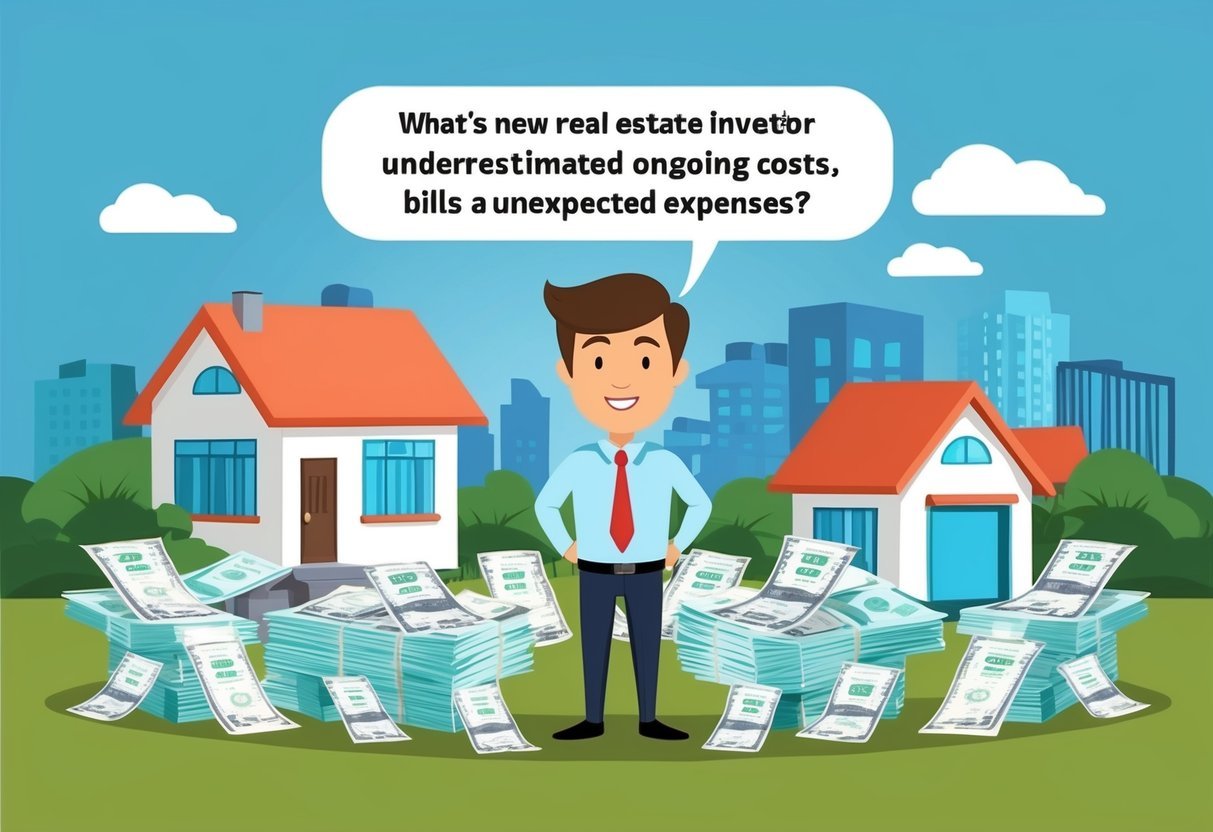Navigating the world of real estate investment can be both exciting and daunting for newcomers.
We often encounter individuals eager to dive into this promising venture with high expectations.
This pursuit requires careful planning and a strategic approach.

Understanding the common mistakes can save us from costly setbacks and guide us toward a more successful investment journey. Our goal is to equip ourselves with the knowledge and insights necessary to avoid pitfalls, ensuring the investments we make are informed and sustainable.
1) Overestimating Property Value
We often get excited about a property’s potential, which can lead to overestimating its value.
It’s important to approach property valuation with a level head, relying on objective data rather than emotions or assumptions.
Looking at recent sales of comparable properties in the area can provide a realistic benchmark.
Conducting a detailed analysis of the local market is crucial.
We need to consider factors like location, property condition, and amenities to arrive at a fair estimation.
Neglecting these elements can result in overpaying for a property or facing difficulty reselling at a profit.
Another key aspect is understanding market trends.
We should stay informed about whether property values are rising or falling in our targeted areas.
This knowledge can impact our investment decisions and help us avoid unrealistic expectations.
Professional appraisals can also offer an unbiased value assessment.
By enlisting the help of a certified appraiser, we gain insights that are free from personal bias.
These expert opinions can validate our valuations and prevent costly mistakes.
Relying too heavily on online valuation tools can be misleading.
While these tools offer quick insights, they often don’t account for unique property features or local market nuances.
Grounding our valuations in comprehensive research and expert advice is essential for accurate assessments.
2) Failing to Budget for Repairs

When investing in real estate, budgeting for repairs can often be overlooked.
While a property’s purchase price may seem attractive, we must remember that initial estimates rarely cover all eventual repairs.
Unexpected repairs can transform a promising investment into a financial burden.
Structural issues, outdated plumbing, or faulty electrical systems can arise without warning.
Keeping an emergency fund can help us address these unexpected situations without derailing our entire budget.
A detailed inspection before purchase can reveal potential repair costs.
Despite the upfront cost, a thorough inspection allows us to plan more accurately for necessary repairs.
We should also consider routine maintenance.
Ignoring minor issues can result in more extensive and costly repairs later.
Proactive maintenance helps us preserve property value and reduces the risk of future expenses.
By accounting for repairs in our budget from the start, we position ourselves for a more sustainable investment.
3) Choosing Poor Locations
Selecting the right location is crucial for real estate investment success.
Poorly chosen spots can lead to prolonged vacancies and minimal returns.
We must emphasize that properties in declining neighborhoods or areas with limited economic growth potential offer less opportunity for appreciation.
We need to focus on locations with a mix of strong employment rates, good infrastructure, and future development plans.
Properties situated near schools, public transport, and commercial hubs often attract more renters and buyers, leading to a more stable investment.
Understanding the nuances of local markets can help us avoid investing in areas with potential hazards.
It’s critical to assess crime rates, school quality, and accessibility when evaluating a location.
Keeping an eye on regional market trends is also important to ensure our investments align with future growth patterns.
Before making any decisions, thorough research and analysis can help minimize risks.
Consulting with local real estate professionals and reviewing comprehensive market reports can provide invaluable insights.
By prioritizing location quality, we can build a more profitable and resilient real estate portfolio.
4) Neglecting Market Research

We often see new investors overlook the importance of thorough market research.
Diving into the real estate market without a solid grasp of current trends and conditions leaves us vulnerable to poor investment decisions.
Our success is significantly influenced by understanding the local economic factors that can affect property values.
Factors such as neighborhood growth, employment rates, and nearby amenities can dramatically impact future returns.
Taking the time to analyze these trends equips us with the knowledge to choose properties wisely.
Relying on data rather than assumptions allows us to predict future market movements, which can be instrumental in making profitable investments.
We also stress the importance of being diligent in studying market demographics.
Knowing who lives in the area, what the predominant lifestyle is, and what potential tenants or buyers value can guide us to properties with better demand.
We should also remember to examine property history, local zoning laws, and potential development plans.
This helps us anticipate challenges and address them before they impact our investments.
Emphasizing research helps us set realistic expectations regarding rental yields or resale values.
Many investors mistakenly rely on hearsay or outdated information, which may lead to inflated expectations and eventual disappointment.
The value of staying informed cannot be overstated in our investment strategy.
Keeping up-to-date with market analyses and expert opinions positions us to seize timely opportunities and circumvent foreseeable pitfalls.
5) Underestimating Ongoing Costs

When we dive into real estate investment, it’s crucial to recognize that ongoing costs can significantly impact our bottom line.
Many new investors mistakenly overlook these expenses, thinking only about the initial purchase price and potential resale value.
This oversight can cause financial strain and unexpected challenges down the road.
Repair and maintenance costs are among the most common ongoing expenses.
Properties wear down over time, and unexpected issues can arise, requiring funds to address them.
We should always set aside a budget for routine maintenance and unexpected repairs to avoid being caught off guard.
Additionally, property management fees can add up.
If we choose to hire a property management company, their fees will be a regular expense.
These fees often cover tenant management, rent collection, and general oversight of the property.
Factoring these costs into our financial plan is essential.
Insurance and taxes represent another significant set of ongoing expenses.
Property insurance protects against damage and liability, while property taxes are a mandatory cost we must pay annually.
It’s vital for us to stay informed about these rates and budget accordingly.
Utilities and other operational costs also add up.
Even if tenants cover their usage, we are often responsible for other utilities or shared facility expenses in multi-unit properties.
Planning for these costs ensures we maintain a positive cash flow.
By acknowledging and preparing for these ongoing expenses, we can better manage our real estate investments and sustain long-term financial health.
Proper budgeting and financial planning allow us to minimize surprises and foster more successful investment outcomes.
6) Skipping Professional Inspections

Overlooking professional inspections can be a significant error for new real estate investors.
When we make property investments, ensuring the property is thoroughly inspected by experts is crucial.
This step helps us uncover potential issues that may not be apparent during initial viewings.
Professional inspections provide valuable insights into the structural condition of the property.
These inspections examine aspects such as the foundation, plumbing, electrical systems, and more.
By skipping this step, we risk purchasing properties with costly hidden problems.
While it may seem like an unnecessary expense, investing in a professional inspection can save us substantial amounts in the long run.
Identifying repairs needed before closing allows us to negotiate with sellers or reconsider our investment.
An inspector’s report can also support our decision-making by providing a clearer picture of a property’s value.
In complete agreements, this transparency is invaluable.
Informed decisions reduce the likelihood of regret post-purchase.
Ultimately, professional inspections form a key part of our due diligence process.
They help protect our investments and ensure we enter into purchases with confidence.
7) Weak Negotiation Skills

Effective negotiation is a vital skill in real estate investing.
As investors, we often encounter various negotiation scenarios, whether we’re purchasing properties, dealing with contractors, or leasing units.
Strong negotiation capabilities can significantly impact profitability and success.
Many new investors underestimate the importance of negotiation or simply lack experience.
This can lead to overpaying for properties or failing to secure the best terms.
It’s crucial that we equip ourselves with the right techniques to assertively and skillfully make deals.
Practicing negotiation through role-playing exercises can help us improve.
Additionally, learning from experienced mentors or attending workshops can offer valuable insights into successful tactics.
Patience, preparation, and a thorough understanding of the market conditions are essential elements of mastering negotiation.
We should also remember that listening is a powerful tool in any negotiation.
By understanding the other party’s interests and concerns, we can tailor our approach to reach mutually beneficial agreements.
This can lead to stronger partnerships and improved investment outcomes.
Facilitating open communication and being clear about our goals can foster trust and make negotiations smoother.
Being able to walk away from a deal if it doesn’t meet our criteria is also crucial.
Knowing our limits helps in avoiding undesirable commitments.
Ultimately, refining our negotiation skills can yield better property prices, favorable contract terms, and stronger investor relationships.
This capability not only aids in immediate transactions but also contributes to our long-term success and growth in the real estate market.
Understanding Market Analysis

Our focus is on comprehending local real estate markets, identifying growth patterns, and recognizing opportunities.
These insights help us make informed investment decisions and better anticipate market shifts.
Researching Local Market Trends
We must thoroughly examine historical sales data and pricing trends to understand the local real estate market.
By evaluating the sale prices and volume of transactions over time, we can spot patterns and fluctuations.
Analyzing economic indicators like employment rates and population growth gives us further context.
We should also keep an eye on demographic changes, such as age distribution and household sizes, which can affect housing demand.
Local government plans, such as infrastructure projects and zoning changes, can significantly impact property values.
Paying attention to planned developments can reveal emerging opportunities or potential challenges.
Additionally, consulting with real estate professionals, like agents and appraisers, provides valuable insights into the nuances of the market.
Their experience and knowledge can help us refine our approach to market analysis.
Identifying High-Growth Areas
To spot high-growth areas, we must focus on regions with signs of expansion and potential future demand.
Look for neighborhoods experiencing infrastructural developments, like new transportation links or commercial projects.
These developments often precede increased housing demand.
Tracking job growth and business investments in an area is crucial.
Successful businesses and low unemployment rates typically result in more people moving to these regions for job opportunities.
This migration drives demand for housing.
Recognizing affordability gaps between emerging areas and established neighborhoods helps us identify where future buyers may seek alternatives.
As prices rise in popular locations, surrounding areas often become attractive options.
Finally, staying informed about policy changes that favor development or incentivize investment can guide us to potential high-growth markets.
Local government initiatives, like tax incentives, can stimulate residential development and attract buyers.
Effective Financial Planning

Effective financial planning in real estate investment requires careful budgeting and securing the right financing options.
A well-structured financial plan can help us avoid potential pitfalls and ensure a smoother investment journey.
Understanding our cash flow, potential expenses, and funding sources is crucial for success.
Creating a Realistic Budget
Creating a realistic budget is fundamental for any real estate investment.
We need to account for purchase costs, ongoing expenses, and potential income.
This includes evaluating property buying costs such as down payments, closing costs, and legal fees.
It’s essential to estimate maintenance expenses, property management fees, and insurance premiums regularly.
Understanding forecasted rental income against these expenses can reveal our property’s cash flow potential.
It also helps us identify buffer zones for unexpected costs.
A detailed, accurate budget minimizes unpleasant surprises and assists us in making informed decisions that align with our financial goals.
Securing Financing Options
Securing financing is another critical aspect of our financial planning.
We must have a firm grasp of available funding options, including traditional mortgages, private lenders, and real estate partnerships.
Traditional bank loans are the most common, requiring detailed documentation of our financial status.
Alternatively, we may explore private lenders offering more flexible terms but usually at higher interest rates.
Real estate partnerships allow pooling resources with other investors to reduce individual financial burdens.
Evaluating creditworthiness and comparing interest rates help us choose the most suitable option, aligning with our investment strategy while maintaining manageable debt levels.
Frequently Asked Questions

In real estate investment, it’s common for newcomers to make notable errors ranging from misjudging property values to insufficient market research.
Understanding these pitfalls can be crucial for success.
What are the typical errors new investors make when assessing investment properties?
Many new investors tend to overestimate property value, leading them to invest more than a property is worth.
They may also overlook the importance of detailed inspections, which can reveal hidden repair costs that affect profitability.
How can over-leveraging impact new real estate investors?
Over-leveraging can be a significant issue for beginners, as it involves borrowing too much to invest in properties.
This approach can lead to financial strain if the property’s income doesn’t cover debt payments, pushing investors into challenging financial positions.
What strategic missteps do novice investors often make with regards to location?
Choosing poor locations for investments is a frequent mistake.
New investors might focus on low property prices without considering factors like neighborhood developments, crime rates, or school districts, which can greatly impact a property’s value and appeal to renters or buyers.
In what ways do new investors fail to plan for cash flow management?
A common oversight is the failure to account for ongoing costs like maintenance, property management fees, and taxes.
Without a solid cash flow plan, investors may struggle to maintain profitability, jeopardizing their investment’s long-term success.
What are common legal or tax misunderstandings among new real estate investors?
Newcomers often misunderstand the complexities of real estate taxes and legal obligations.
Mistakes can include failing to account for property tax increases or overlooking necessary permits and zoning regulations, leading to unexpected expenses or legal troubles.
How do inexperienced investors typically misjudge market timing and trends?
Inexperienced investors may jump into the market without understanding current trends or waiting for more favorable conditions.
This misstep often results in purchasing properties at inflated prices or during downturns.
These actions can diminish returns and complicate future decision-making.

